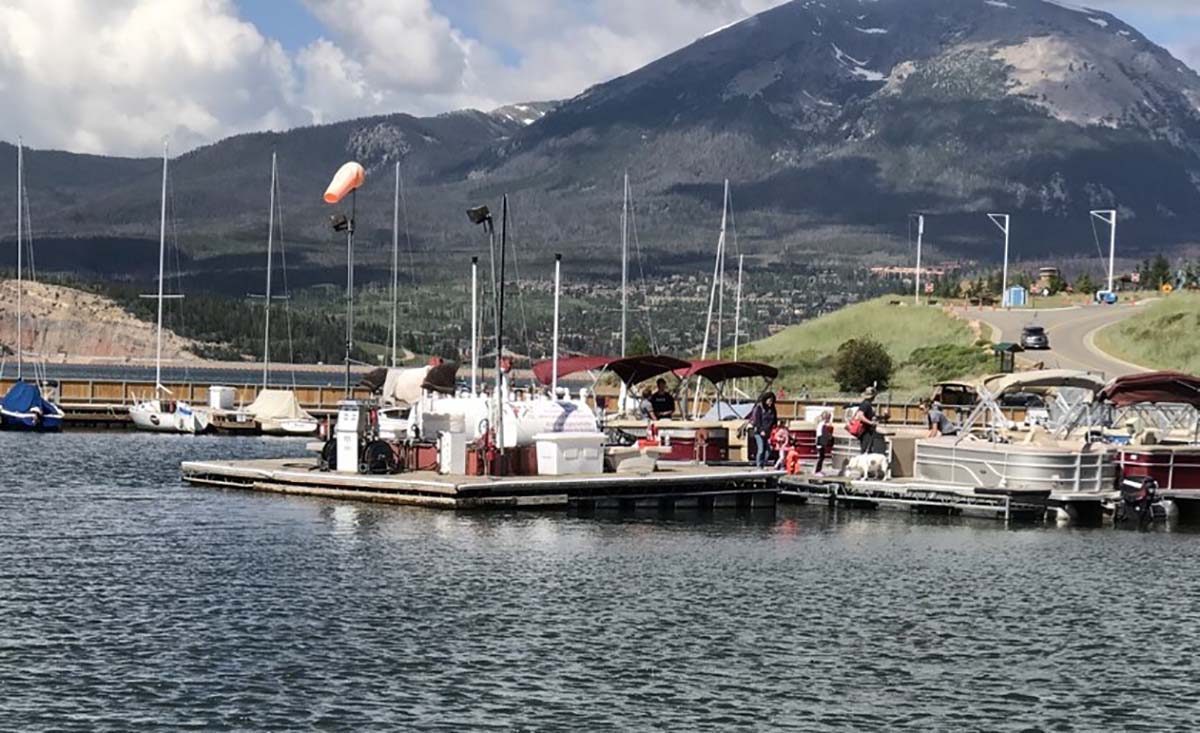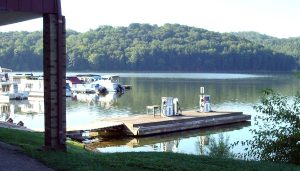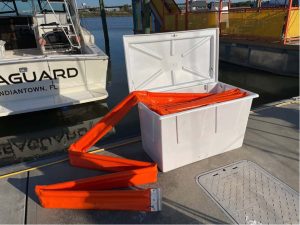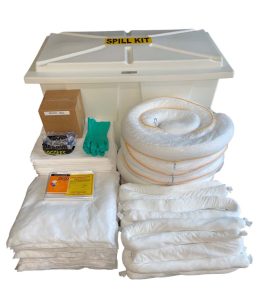
The True Cost of Marina Spills
Published on January 13, 2025Marina owners, operators and guests have an obligation to protect and preserve their immediate environments from harmful pollutants — especially those entering any waters of the United States. It is not only good practice; it is the law.
Fuel and oil can leak from any number of locations at a marina: fuel docks, tanks, nozzles, fuel lines and boats themselves. Those who either knowingly or negligently violate the law risk substantial fines and penalties that could shutter business operations permanently.
There are a lot of misconceptions about regulations and a lack of education about effective spill mitigation products. Taking the time to research, plan for and understand options can help protect a marina from crippling violations and a tarnished reputation. It can also help protect the integrity of marine waters that form the basis of marina life itself.
Responsibilities & Penalties
The U.S. Environmental Protection Agency (EPA) is the overarching federal authority that enforces environmental laws. The agency works to ensure citizens have access to clean air, land and water. As such, the EPA holds marinas accountable for pollutant discharge. In addition to the federal regulations, marinas must also comply with a variety of state-specific rules, statutes and local safety codes. Lack of responsibility comes with a price — both literally and figuratively.
Monetarily, the price comes in the form of fines and penalties, which may worsen depending on the number of violations, the time it takes for adequate cleanup and whether the pollutant spill was preventable or accidental. Under the EPA’s Criminal Provisions of Water Pollution, a person (or person in charge of a vessel) who negligently or knowingly discharges identified pollutants, oils or hazardous substances into waters of the United States, adjoining shoreline or into a contiguous zone in harmful quantity — or without a NPDES or 404 permit (or in violation of a permit) — faces prison time and fines. The baseline penalties established by the EPA for negligent violations is up to one year in prison and up to $25,000 per day in fines, and for knowing violations penalties are up to three years in prison and up to $50,000 per day in fines.
However, the ‘price’ of non-compliance is so much more than a simple dollar figure. The true cost of ignoring or improperly cleaning up pollutant spills is environmental degradation. Contaminants such as hydrocarbons (fuels, oils, etc.) pose a serious threat to water and aquatic life, with long-lasting, if not irreversible, effects.

Oil spills in shallow waters can damage sensitive habitats like seagrass beds and intertidal zones and can be ingested either directly or via the food chain causing damage to internal organs and lungs. Oil and fuel spills also prevent oxygen from reaching the waters below, impacting creatures and plants that depend on dissolved oxygen for survival. Oil can also destroy the insulating ability of fur-bearing mammals such as sea otters or the water repellency of bird feathers, making them more prone to harsh conditions and temperatures.
Consider that one drop of oil can cover an area roughly the size of a two-car garage, while spilling one quart of oil can cover nearly a quarter of an acre.
When marinas are good stewards of the environment, they are protecting and defending their own livelihood. A clean marine landscape is not only beautiful, but bountiful — good for the ecosystem and good for business.
Preparation & Products
The best way to handle a spill is to prevent it from happening in the first place. Regular inspections, maintenance checks, leak-detection examinations and training with staff can all protect marinas against potential spills.
Even with the best laid plans, mistakes and leaks happen. Marinas have different sizes and configurations of fuel systems to meet their needs: in-ground and above-ground fuel tanks, floating tanks, fuel lines running beneath gangways or within chase lines of docks, various fueling stations and nozzles.
All of these harbor potential sources for leaks. Automatic shutoffs in fuel dispensers can minimize spills. Marinas can also install oil/fuel alarm sensors in locations such as bilges, docks or directly on the water surface. These sensors can be used to detect changes in the electrical properties of water or determine when an oil has been introduced, which provides marina staff the opportunity to respond quickly.

In addition to regular inspection and maintenance of marina infrastructure, marinas should develop an emergency response plan and identify one or two staff members responsible for spill management. It is also good practice to educate all marina staff, members and guests about the importance of spill prevention, response and potential consequences.
Marine Spill Kits
All marinas should be equipped with a proper spill kit. Kits come in a wide variety of sizes, absorbency capacities, applications and costs. Marinas need to perform due diligence in ensuring the spill kits they purchase are effective and appropriate for the environment at hand. When a spill happens, time is of the essence. Having the right clean-up tools on hand that are easily accessible and organized means that staff can respond to any spill quickly and clean it up safely, without consequential delays.
A quick online shopping search for “spill kits” yields a wide variety of results. Not all spill kits are created equal and marinas can end up with a product that fails them. For example, some spill kits are intended for use on dry land only. While they may soak up spilled gasoline or oils as promised, they will also absorb water. Putting elements from these kits into the water to clean up a spill will result in a sunken, useless product. That means wasted time, wasted money and ineffective cleanup.
To address spills in the water, marinas need to purchase dedicated marine spill kits. These are designed to absorb fuel, oil and other hydrocarbons without also absorbing water so they float on the water’s surface rather than sinking. Marinas need to determine what kit is appropriate for their specific needs and potential pollutants. Many kits are color-coded: white for oil-only spills, gray for universal spills and yellow for HAZMAT or chemical spills.

A suitable marine spill kit should include, at minimum, a variety of sorbent materials such as booms (long, tube-shaped floats filled with absorbent material that can connect as an absorbent barrier), socks (smaller, shorter booms), pillows, and pads to contain and absorb spills. Some companies like Trionic Corp go a step further, offering these items in ample quantity and quality stored in a dock box and accompanied by contaminant disposal bags, safety gloves, goggles, rags and an emergency response guidebook. The Trionic Corp Dock Spill Kit also meets U.S. EPA, United States Coast Guard and Clean Marina requirements.
To purchase the correct spill kit, marinas need to consider potential spill volume amounts. A 5- or 10-gallon kit, for instance, might resolve one or two small spills, but if/when those materials are depleted, what is left? Being responsible for spill mitigation means being prepared. Purchase a kit with enough product to address larger, or multiple spills. Reorder as soon as the products are used and keep kit refill products on hand so as not to be caught empty handed if another spill occurs while a product is on re-order. Remember: time matters. The sooner a spill is cleaned up, the smaller the penalty and the less severe the pollution.
Reputation & Marketing
Spills at marinas come with additional non-monetary costs, tied directly to how these situations are handled. When marinas approach a spill with haste, insufficient attention to detail or disregard for regulatory and environmental compliance, they can earn a reputation of indifference, irresponsibility or neglect. When approached with care, concern and respect for the law and what it strives to protect, marinas can earn a reputation of excellence and attract boat owners who value well-maintained marina environments. After all, people want to keep their vessels at nice marinas. Trust is built when a marina is well-kept, clean, secure and aesthetically pleasing. Unattended oil slicks or fuel spills in the water not only compromise the integrity of the marina environment, but they also wreak havoc on valuable boats and marina infrastructure and erode trust in marina ownership.
How marinas handle spills will also affect their Clean Marina status. As more marinas elevate their standards to meet Clean Marina requirements, the industry grows ever competitive. These types of certifications are what set one establishment apart from another, so attention to things like pollutant spills and general marina maintenance and aesthetics matter. Further, to retain Clean Marina certification, marinas generally need to be inspected and prove compliance every five years, although the frequency can vary from state to state. Having a violation or fine with the EPA for spill negligence can directly impact a marina’s ability to retain this coveted status.
In Conclusion
Marina owners, operators and guests play a vital role in protecting U.S. waters from harmful pollutants. By adhering to regulations enforced by the U.S. EPA, marinas can avoid hefty fines and potential prison time. More importantly, preventing spills safeguards the delicate marine ecosystems that are the heart of marina life.
Taking proactive measures, such as conducting regular inspections, maintenance and staff training — as well as having the appropriate marine spill kits on hand — is not only good for the environment, but also for business.
Dan Williams, PLA, ASLA, AHLP is senior landscape architect at MSA. He can be reached at dwilliams@msa-ps.com.
Marcus Rue, PE is project manager at MSA. He can be reached at mrue@msa-ps.com.
Todd Harrison is general manager & vice president of sales at Trionic Corp. He can be reached at todd@trioniccorp.com.
Rick Mowrer is president of Texas Boom Company. He can be reached at rick@texasboom.com.
| Categories | |
| Tags |





